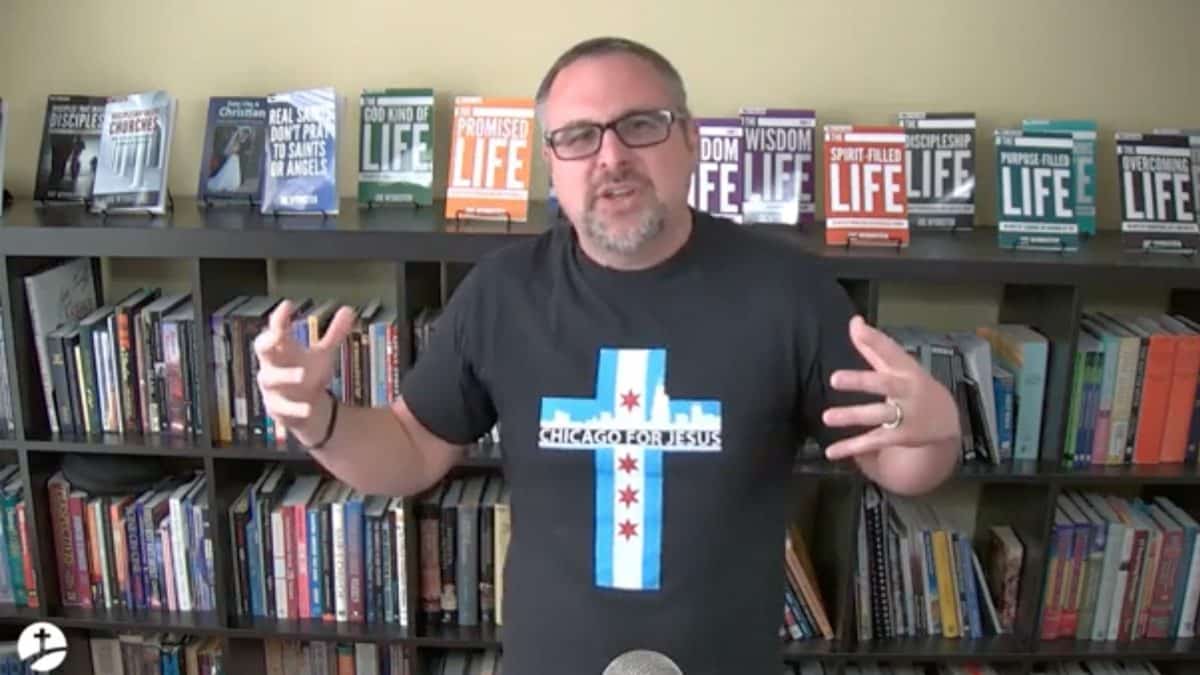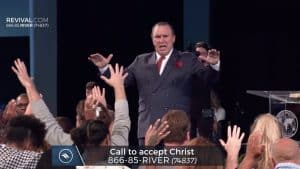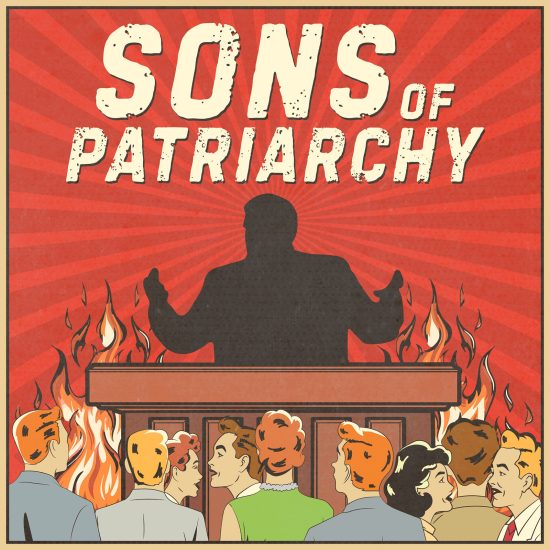
(RNS) — Almost as soon as the COVID-19 pandemic began, a tug of war developed between federal, state and local policymakers and a small group of sometimes angry Christian pastors bent on holding in-person services. But as stay-at-home restrictions were gradually lifted and the definition of “essential services” expanded, a second wave of church leaders appealed to the First Amendment to challenge bans on gatherings with lawsuits and open defiance. They’ve had help from the Justice Department and, most recently, an order from President Donald Trump deeming churches essential services. Meet the pastors who have refused to close.
Tony Spell – Life Tabernacle Church, Baton Rouge, Louisiana

Pastor Tony Spell speaks to media after holding an evening service at Life Tabernacle Church in Central, La., Tuesday, March 31, 2020. Spell is facing misdemeanor charges for holding services previously despite a ban on gatherings amid the coronavirus pandemic. (AP Photo/Gerald Herbert)
Spell, one of the first — and most outspoken — pastors to resist state coronavirus restrictions, preached to a crowd of more than 300 at his church in early March and continued holding services through April in defiance of his state’s stay-at home order and his own house arrest. “We feel we are being persecuted for the faith by being told to close our doors,” Spell told The Washington Post. “We’re a Pentecostal denomination, and when we gather and pray the Holy Ghost comes in the midst. There are healings, signs, wonders, some things done together in the church that can’t be done in a live stream.” Spell was later charged with aggravated assault for driving a bus toward a person protesting outside the church.
Jonathan Shuttlesworth – Revival Today, Pittsburgh

Jonathan Shuttlesworth. Video screengrab via YouTube
In late March, the televangelist and pastor called for “an outdoor Easter blowout service. Not online. A national gathering. You come from all over. Like Woodstock. And we’re gonna gather and lift up Jesus Christ.” Not content to host his own gathering, Shuttlesworth criticized churchgoers who would take anti-virus precautions: “If you’re putting out pamphlets and telling everybody to use Purell before they come into the sanctuary … you should just turn in your ministry credentials and burn your church down,” he said.
Rodney Howard-Browne – The River at Tampa Bay Church, Tampa, Florida

Pastor Rodney Howard-Browne, top, prays over individuals during a service, Sunday, March 29, 2020, at The River Church in Tampa. Video screengrab
By early April, 18 states had shut down and authorities began to put teeth in their bans. Some pastors resorted to conspiracy theories to explain their resistance. After initially refusing to shut down, Howard-Browne finally closed his nondenominational megachurch in early April — to protect his congregants “not from the virus but from a tyrannical government,” according to The Hill — after he was arrested for hosting Sunday services with nearly 500 people in attendance. He has claimed China created the coronavirus as a weapon to destroy the U.S. economy. “The World Health Organization has come in and is using a pandemic to take over not just America, but the whole of the world,” Howard-Browne told viewers of a livestream. Charges against him were dismissed earlier this month.
Stanley “Rusty” Chatfield III – Northern Michigan Baptist Bible Church, Alanson, Michigan

Stanley “Rusty” Chatfield III. Photo via northernbible.org
As state bans exempted businesses deemed essential — including big-box stores, liquor stores and, in some places, marijuana dispensaries — some pastors began to challenge the definition of “essential,” claiming churches were unfairly left out. The day that his son, Michigan House Speaker Lee Chatfield, filed his own suit against Gov. Gretchen Whitmer’s executive orders, Chatfield joined two other church leaders in filing a suit claiming the governor’s stay-at-home order violated the First Amendment rights to free exercise and assembly. “Churches are essential to the health and well-being of everyone,” said Chatfield’s lawyer. “If Walmart and Home Depot can open and sell goods to customers while following CDC guidelines, surely churches can do the same.”
Whitmer later made clear that she would not apply penalties to churches for gatherings exceeding the limits outlined in her bans.
Alvin Gwynn Sr. – Friendship Baptist Church, Baltimore

The Rev. Alvin J. Gwynn Sr., of Friendship Baptist Church in Baltimore, sits in his church’s sanctuary March 19, 2020. (AP Photo/Steve Ruark)
Some have mixed caution with rebellion. On May 15, Gwynn, pastor of 800-member Friendship Baptist Church in northeast Baltimore, announced plans to admit as many as 250 people to each of two Sunday worship services in defiance of Mayor Bernard Young’s executive order prohibiting gatherings of more than 10. “We’ll follow distancing guidelines, and do this safely, but we’re going to be open at 50% capacity like the governor said,” Gwynn announced. “I don’t know what the mayor’s trying to do. He wants to have a knock-down about First Amendment rights? He’s the mayor, not the pastor of churches in the city.”
Scott Erickson – Peoples Church, Salem, Oregon

Scott Erickson. Video screengrab
Among those who chose to fight in court was Erickson. After an Oregon circuit judge tossed out Gov. Kate Brown’s restrictions on gathering on May 17, Erickson said his 3,700-person church would remain closed awaiting a ruling from Oregon’s Supreme Court, which halted the lower court’s order. “We’re going to wait until there’s finality,” said Erickson. No firebrand, he plans to seat congregants in every other row, wipe down surfaces and adhere to 6-foot social distancing, masks optional. Meanwhile, worshippers are tuning in to his sermons on livestream and in the parking lot via radio. “It would certainly impact our capacity, but that’s where we’re at on this,” Erickson said.
Michael Jacobsen – Palermo Bible Family Church, Palermo, California

Michael Jacobsen. Video screengrab
Several California churches have sued to strike down local bans on church gatherings, or to be moved to an earlier reopening phase, and were denied, a point punctuated when the Justice Department cautioned state officials that their restrictions were possibly unconstitutional. Last week, 1,200 pastors and other leaders announced their intention to reopen regardless of state orders.
But at least two churches have been chided for holding services where an infected person was in the crowd. In late May Jacobsen admitted that a person with COVID-19 attended a Mother’s Day service with more than 180 people at his Pentecostal church. “They didn’t do it intentionally,” he said in an online sermon. “It was never my heart to put our church in harm’s way. That has never been my desire.”
On Monday (May 25), Gov. Gavin Newsom released guidance for churches to begin reopening May 31.
Joseph Wyrostek – Metro Praise International Church, Chicago

Joseph Wyrostek. Video screengrab
As daily numbers of deaths have dropped and states have reopened nationally, legal avenues have given way to defiance, or what one pastor in the Belmont Cragin neighborhood of Chicago — a coronavirus hot spot — calls “passively resisting.” Wyrostek of Metro Praise International Church has welcomed dozens of worshippers in past weeks, saying he would not be responsible if one of the attendees becomes ill, and has accepted the city’s threats to fine him. “We’re noticing people are dealing with PTSD right now (from the virus) and projecting that onto us by saying they want us to be more strict. But we’re promoting the testing and social distancing,” said Wyrostek.
The pastor told the Chicago Sun Times: “We can gather and spread our hope, our love, our religion without interference from the government. … What is an infection rate, anyway? It’s people spreading a virus. A virus will get spread one way or another.”






